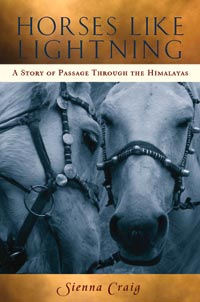Sienna Craig’s Mustang Adventure
Finding Home in the Himalayas
The world beyond our doorstep can be a frightening place: vast, unknowable, full of strange people engaged in foreign activities for reasons beyond our comprehension. But for some who venture out of the comfort zone of home, what was once strange becomes familiar, and what was once familiar, strange.
For Santa Barbara native Sienna Craig, questions about the nature of home have become central themes in her life: Where is it? What makes it so? And what can we learn from leaving it behind?
Craig is the author of Horses Like Lightning, a nonfictional account of the years she spent in the Himalayan Kingdom of Mustang, studying the relationship between people and horses. Part memoir, part ethnographic study, the book describes a young woman’s sincere attempts to understand a foreign culture, and to find her place within it.
Now a professor of anthropology at Dartmouth College, Craig grew up horse-crazy in Santa Barbara. She got her first horse when she was 10, and devoted much of her childhood to horse care, training, and competitions. But when she reached her junior year at San Marcos High School, the expense of college tuition loomed, and it was decided she should sell her horse and start saving money. “It seemed necessary,” Craig recently told me over the phone from her Dartmouth office. “It opened up to me the possibility of coming east for college, which was not something that a lot of folks in Santa Barbara did at that time, at least in circles I was familiar with.”

In 1991, Craig was accepted to Brown University, and off she went to the other side of the country. But her adventure had just begun. From Rhode Island, she traveled to Nepal to study abroad for a year. The concepts of expedition and discovery were not new to Craig; her father was an archaeologist, her mother and stepfather artists with a keen interest in investigating the world around them. But in Nepal, Craig discovered a passion she had not known before: the formal study of human culture.
“That was my first real exposure-at least deep exposure-to methods of ethnography and to the ethics of ethnographic field research,” she explained. “I got bitten by the bug of anthropology.” She was also excited to discover a rich horse culture in Mustang, an ethnically Tibetan region of Nepal. There, horses were central to society and were used for far more than just sport, and Craig determined to return to the region for further study. Horses Like Lightning is the story of her journey through Mustang, first as a study abroad student, then as a Fulbright Scholar, and always as an outsider seeking a deeper understanding of the Mustangi way of life.
In her book, Craig blends frank observation and history lessons with poetic personal recollections and musings. The book’s title comes from a poem written for her by one of her hosts, Tshampa, a practitioner of Tibetan medicine and a specialist in horses. “Horses, like lightning, move quickly in all directions,” Craig’s translation from the Nepali reads. It’s one example of the rich metaphorical language with which Mustang’s horse culture is laced, but it’s also a metaphor for Craig’s own journey of discovery.
In traveling through Nepal and meeting doctors and wise men, locals and travelers, homemakers and hoteliers, members of royalty and cowboys, Craig was also conducting an investigation of her own impulses. “What did it mean that I was choosing to build a connection to a place that was, literally and figuratively, so far away from my roots?” she asked. Witnessing ancient medical practices that some Western veterinarians label as primitive and useless, she described her struggle to reconcile “empirical realities and so-called belief” and found herself “wondering if my knowledge of Western veterinary care was actually limiting my experience in Mustang, making it more difficult for me to dislodge my sense of truth from that which I was now learning.”
On the phone from Vermont, Craig explained, “What I was having to do in those early months in Mustang was to come to terms with the fact that there are multiple empirical realities in the world and multiple ways of knowing that sometimes come into conflict with each other. I was beginning to struggle to describe and analyze and fairly represent other ways of knowing.”
But for Craig, description was not enough-she wanted to contribute more directly as well. To that end, she and her husband have founded Drokpa, a nonprofit organization that provides grassroots support to rural Himalayan communities.
As for her relationship to her homeland, Craig said Santa Barbara is both familiar and strange these days. “It’s the only place I can return to and feel a sense of deep time and the things that formed me,” she said. “But I’ve lived lots of other places since then, so I feel at once like a Californian and more like an anthropologist, somewhere between the inside and the outside.” Given her field of study, it’s only natural. “Anthropology,” she said, “is fundamentally about reconciling differences and finding commonalities.”
Craig’s story of her journeys, both international and internal, make for compelling reading, whether you’re a horse-lover, an armchair traveler, a fellow adventurer, or simply someone curious about what happens in the places where cultures meet and the concept of what it means to be home transforms.
4•1•1
Horses Like Lightning: A Story of Passage through the Himalayas was recently released by Wisdom Publications. For more information, visit wisdompubs.org or siennacraig.com.



